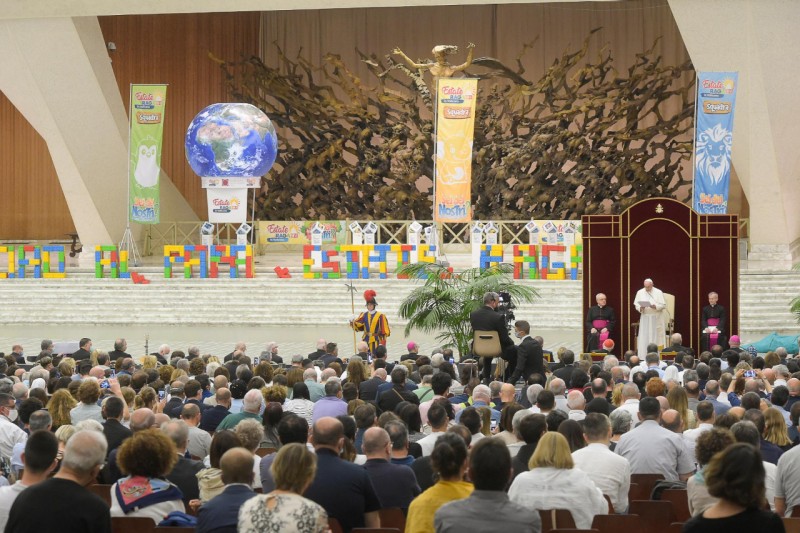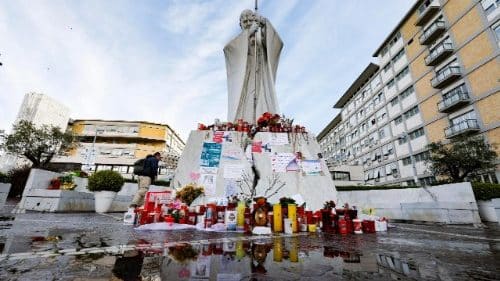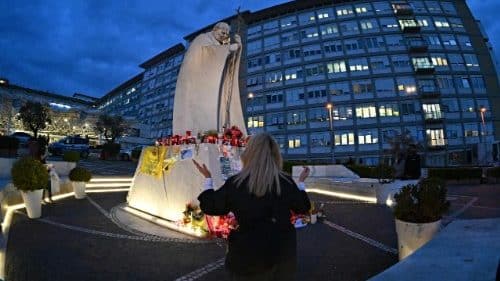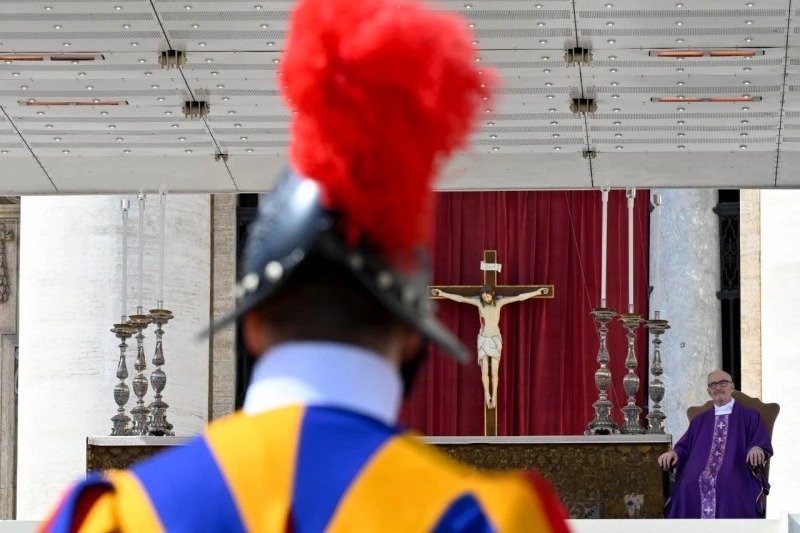Pope Greets Italian Caritas on 50th Anniversary
Complete Text of the Holy Father’s Address

On Saturday morning, June 26, 2021, Pope Francis received in audience the members of Italian Caritas on the 50th anniversary of its foundation. Here is a translation of the complete text of the Holy Father’s address, made available by the Holy See Press Office.
* * *
The Holy Father’s Address
Dear Brothers and Sisters, good morning and welcome all!
I thank Cardinal Bassetti and the President of Italian Caritas, Monsignor Redaelli, for the words he addressed to me in the name of all. Thank you. You have come from all over Italy, in representation of the 218 diocesan Caritas and Italian Caritas, and I rejoice to share this Jubilee with you, your fiftieth anniversary of life! You are a living part of the Church, you are “our Caritas,” as Saint Paul VI liked to say, the Pope who wanted it and cemented it. He encouraged the Italian Episcopal Conference to create a pastoral organization to promote the testimony of charity in the spirit of Vatican Council II so that the Christian community was a subject of charity. I confirm your task: in today’s changing times, there are many challenges and difficulties; there are ever more faces of the poor and complex situations in the territory. However, Saint Paul VI said, “our Caritas organizations work beyond their strength” (Angelus, January 18, 1976). And it’s true! The 50-year anniversary is a stage of gratitude to the Lord for the way followed and to renew, with His help, the impetus and commitments. In this connection, I would like to point out three ways, three paths on which to continue the course.
The first is the way of the last. We begin from them, the most fragile and vulnerable — from them. If we don’t begin from them, nothing is understood. And I permit myself a confidence. The other day I heard about this, words of experience from the mouth of Father Franco, present here. He doesn’t want us to say “Eminence,” “Cardinal Montenegro” only Father Franco. And he explained this to me, the path of the last because he lived it his entire life. In his person, I thank the many men and women who engage in charity, because they have lived it so; they have understood the way of the last. Charity is mercy that goes out to seek the weakest, that goes to the most difficult frontiers to liberate people from the slavery that oppresses them and make them protagonists of their own life. Over these five years, many have been the significant options that have helped Caritas and the local Churches to exercise this mercy: from conscientious objection to support of voluntary work; from commitment to cooperation with the South of the planet to emergency interventions in Italy and worldwide; from a global focus on the complex phenomenon of migration, with innovative proposals such as the humanitarian corridors, to the activation of instruments capable of approaching the reality, such as the Listening Centers, Observatories of poverty and resources. It’s lovely to broaden the ways of charity, always keeping one’s gaze on the last of all times. To widen one’s gaze, yes, but from the eyes of the poor, I have before me. It’s there where one learns. If we are not capable of looking at the eyes of the poor, to look at them in their eyes, to touch them with an embrace, with the hand, we won’t do anything. It’s with their eyes that we must look at the reality, because looking with the eyes of the poor we see reality in a different way than that which stems from our mentality. History is not looked at from the perspective of the victorious, who make it seem beautiful and perfect, but from the perspective of the poor, because it’s Jesus’ perspective. It’s the poor who put their finger in the wound of our contradictions and make our conscience anxious in a healthy way, inviting us to change. And when our heart, our conscience is not anxious when looking at the poor . . . stop . . . we should stop: something isn’t working.
A second inalienable way: the way of the Gospel. I’m referring to the style one must have, which is only one, that of the Gospel. It’s the style of humble love, concrete but not flamboyant, which is proposed but not imposed. It’s the style of gratuitous love, which looks for no rewards. It’s the style of availability and of service, in imitation of Jesus who made Himself our servant. It’s the style described by Saint Paul, when he says that charity “bears all things, believes all things, hopes all things, endures all things.” (1 Corinthians 13:7). I am impressed by the word all. All, he says to us, to those of us who like to make distinctions. All, <because> charity is inclusive; it’s not concerned only with the material aspect or only with the spiritual. Jesus’ salvation encompasses the whole man. We need a charity dedicated to the integral development of a person: a spiritual, material, and intellectual charity. It’s the integral style you experienced in the great disasters, also through twinning, a lovely experience of total alliance in charity between the Churches of Italy, of Europe and of the world. However, this, as you well know, shouldn’t happen only on the occasion of disasters: we Caritas and Christian communities must always be ready to serve the whole man, because “man is the way of the Church,” according to Saint John Paul II’s concise expression (cf. Encyclical Letter Redemptoris Hominis, 14).
The way of the Gospel shows us that Jesus is present in every poor person. It’s good to remember this in order to free ourselves from the ever recurrent temptation of ecclesiastical self-reference and to be a Church of tenderness and closeness, where the poor are blessed, where the mission is at the center, where joy is born of service. Let us remember that God’s style is the style of closeness, of compassion, and of tenderness. This is God’s style. There are two evangelical maps that help us not to get lost on the way: the Beatitudes (Matthew 5:3-12) and Matthew 25 (vv. 31-46). In the Beatitudes, the condition of the poor is clothed with hope and their consolation becomes a reality, while the words of the Last Judgment — the protocol with which we will be judged — makes us see Jesus present in the poor of all times. And from the Lord’s overwhelming expressions of judgment stems also the invitation to the parrhesia of the complaint, which is never a polemic against someone, but a prophecy for all: it’s to proclaim human dignity when it is trampled; it’s to make the suffocated cry of the poor heard; it’s to give voice to those that don’t have it.
And the third way is the way of creativity. The rich experience of these fifty years is not a baggage of things that must be repeated; it’s the basis on which one must build to break down constantly what Saint John Paul II called the imagination of charity (cf. Apostolic Letter Novo Millennio Ineunte, 50). Don’t get discouraged over the growing number of new poor people and new poverties. There are so many and they are increasing! Continue to cultivate dreams of fraternity and be signs of hope. Immunize yourselves against the virus of pessimism by sharing the joy of being a great family. In this fraternal environment, the Holy Spirit, who is Creator and creative, and poet will suggest new ideas, appropriate to the times in which we live.
And now, after this Lenten sermon, I want to say thank you, thank you. Thank you all, to the workers, the priests, and the volunteers! Thank you also because, on the occasion of the pandemic, the Caritas network intensified its presence and alleviated the loneliness, the suffering, and the needs of many. There are tens of thousands of volunteers, among whom are many young people, including those dedicated to civil service, who in this time of listening have offered concrete answers to those in need of help. It’s precisely to the young that I would like attention to be given. They are the most fragile victims of his time of changes, but they are also the potential architects of a change of era. They are the protagonists of the future. They are not the future, they are the present, but they are the protagonists of the future. The time is never wasted that is dedicated to them to knit together, with friendship, enthusiasm and patience, relations that overcome the cultures of indifference and appearances. “Likes” are not enough to live: fraternity is needed; true joy is needed. Caritas can be a gymnasium of life to help many young people to discover the meaning of gift so that they savor the good taste of rediscovering themselves by dedicating their time to others. By doing so, Caritas itself will continue being young and creative; it will keep a simple and direct gaze, which directs itself without fear to the on High and to the other, as children do. Don’t forget the model of children: to the on High and to the other.
Dear friends, please remember these three ways and follow them with joy: to begin from the last, to keep the style of the Gospel, to develop creativity. I greet you with a phrase of the Apostle Paul, whom we will celebrate in a few days: “the love of Christ urges us” (2 Corinthians 5:14). The love of Christ urges us. I hope that you will let yourselves be urged by this charity: feel yourselves every day chosen for this love, experience the Lord’s merciful caress on you and take it to others. I accompany you with prayer and I bless you, and I ask you, please, to pray for me. Thank you.
© Libreria Editrice Vatican
Translation by Virginia M. Forrester
Related

Pope Francis spent a peaceful night at the Gemelli Polyclinic
Exaudi Staff
11 March, 2025
1 min

Pope Francis shows stable improvement
Exaudi Staff
10 March, 2025
1 min

“The Lord is with us and takes care of us, especially in the place of trial”
Exaudi Staff
09 March, 2025
8 min

The Pope: We need the “miracle of tenderness”
Exaudi Staff
09 March, 2025
2 min
 (EN)
(EN)
 (ES)
(ES)
 (IT)
(IT)

